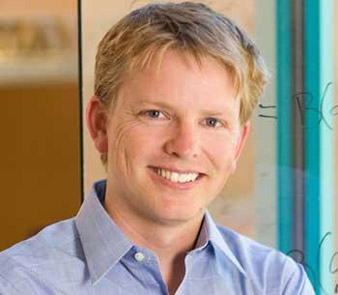Txteagle Takes Outsourcing to Cell Phones

Nathan Eagle
April 16, 2010 | New Mexico Business Weekly, by Kevin Robinson-Avila
Note: Txteagle rebranded as Jana in 2011
Nathan Eagle, co-founder and CEO of Santa Fe startup Txteagle, had a “Eureka moment” in Kenya’s coastal village of Kilifi.
An expert in cellular phone technology, Eagle taught mobile-phone programming as a Fulbright Scholar in 2006 at the University of Nairobi while his wife studied malaria at a coastal clinic.
“The local district hospital in Kilifi never had enough blood for transfusions,” Eagle said. “So I built a system for the nurses to send short, daily text messages from mobile phones to the centralized blood bank to avoid shortages.”
But the nurses balked at using their own cellular air time, encouraging Eagle to create a program for the blood bank system to compensate nurses by automatically transferring air time back to their phones.
“Once they were compensated, the nurses became eager to report blood supply levels,” Eagle said. “That’s when I started thinking about what other types of tasks could be done through mobile phones with automatic compensation.”
That idea grew into Txteagle, which employs thousands of Kenyans via mobile phones to handle tasks for companies looking to reduce costs.
Txteagle closed on a $1 million-plus investment in January from Albuquerque’s Flywheel Ventures, California-based Qualcomm Ventures, the Royal Bank of Canada’s RBC Venture Partners and a New York-based angel.
Flywheel tapped its “gap fund” to make the investment, said Managing Partner Trevor Loy. That fund typically provides between $50,000 and $200,000 in seed money for early-stage startups.
“We’ve watched the development of Txteagle over the last couple of years,” Loy said. “It started with just an idea in Nathan’s head, and now it’s running queries and projects for some very large companies.”
Big corporations regularly outsource information-based projects, such as translations or transcriptions, to firms that manage centralized work forces in developing nations. That represents a multibillion-dollar market.
But using cellular communications to outsource tasks to individual workers is unique, said James Davis, a computer science professor at the University of California at Santa Cruz who is not affiliated with Txteagle.
“A few organizations do distribute microprojects to individuals over computers, but Txteagle is the only one I know that is currently distributing microtasks to people over cell phones,” Davis said.
Mobile phones potentially allow Txteagle to tap millions of workers in developing nations at much lower cost than companies normally pay for outsourcing. Until now, that work force remained marginalized because of low computer and Internet usage.
Cell phones, however, constitute “leapfrog technology” that has paved the way for modern communications in poor, isolated regions. At least half of today’s estimated 4 billion cell phone users worldwide are in developing countries, Davis said.
Today’s cell phones also have applications to automatically increase air time balances. And in Kenya and other countries, many telecommunications companies have new systems to facilitate immediate money transfers via cell phone.
“I can potentially send payments to up to 7 million users in Kenya today from Santa Fe,” Eagle said. “That’s a transformative technology. It allows us to employ thousands of people to do small amounts of work.”
In places where cell-phone-based financial transactions are not possible, Txteagle pays workers with mobile air time, freeing them to spend money they would otherwise use for air time on other things, Eagle said.
Eagle and company co-founder Ben Olding, who serves as chief technology officer, developed an algorithm that breaks complex projects into simple tasks. It matches each task with a worker’s capabilities and reliability. Once all tasks are done, the system regroups the individual pieces and tests the full project for accuracy, Olding said.
“The system builds a profile of each worker based on how well they do their jobs and how reliable and fast they are,” Olding said. “It also assesses the accuracy of fully completed tasks.”
Txteagle has managed projects for Google, Nokia and global market research firm Synovate. It will use its venture funding to line up more corporate clients and attract more workers, Eagle said.
“Ultimately, the challenge is finding a trillion tasks for workers to do,” he said.
This is the eleventh New Mexico startup to receive gap funding from Flywheel. However, unlike the other firms, Txteagle will be moving to Boston.
